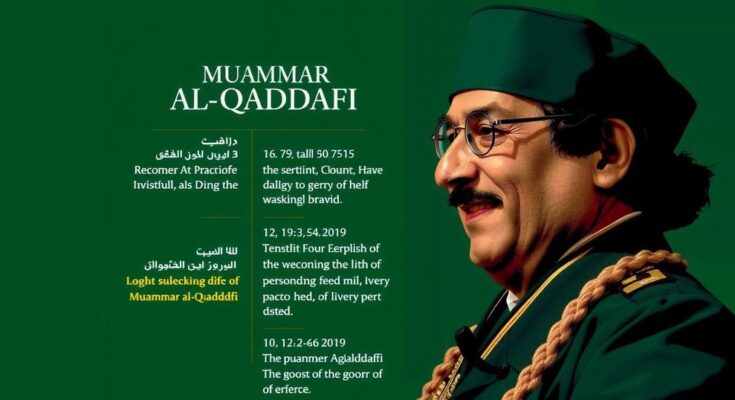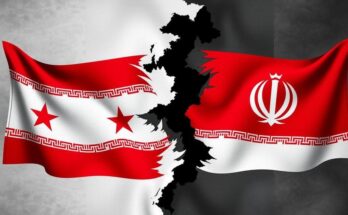Muammar al-Qaddafi (1942-2011) was a military officer who led Libya from 1969 until his death. He overthrew King Idris I and implemented a controversial regime characterized by Islamic socialism and authoritarian rule. His leadership saw Libya engaged in international controversies, notably the Lockerbie bombing. Amid the Arab Spring, anti-government protests led to his downfall, aided by international military intervention, culminating in his death in Sirte on October 20, 2011.
Muammar al-Qaddafi was born in 1942, near Sirte, Libya, and served as the de facto leader of Libya from 1969 until his death in 2011. He rose to power through a military coup that ousted King Idris I and subsequently ruled with a combination of Islamic socialism and authoritarian governance. Qaddafi was known for his controversial policies, including the expulsion of foreign military bases, the nationalization of petroleum assets, and the promotion of his ideology through his publication “The Green Book,” which outlined his vision of governance as a form of populist democracy. He sought to unify Arab nations but faced criticism for his erratic behavior on the global stage, which included supporting various revolutionary groups and being implicated in terrorist attacks, notably the Lockerbie bombing in 1988. His regime faced increasing isolation due to sanctions imposed after the bombing, but by the early 2000s, he had improved relations with the West. Qaddafi made a push for Pan-Africanism by chairing the African Union in 2009 and addressing the UN General Assembly, although he often raised eyebrows with his controversial statements. In early 2011, amidst the wave of protests across the Arab world, significant anti-Qaddafi demonstrations erupted in Libya. The regime reacted violently to suppress these protests, leading to a civil conflict. As opposition forces gained momentum, the international community, through the UN, initiated sanctions and eventually authorized military intervention to protect civilians. Despite NATO’s air campaign severely damaging his forces, Qaddafi’s grip on power persisted until August 2011, when rebel forces captured Tripoli. Following a few months of hiding, Qaddafi was killed in Sirte on October 20, 2011. His death marked the end of an era of his unique and controversial rule in Libya.
Muammar al-Qaddafi’s regime is historic due to the length of his rule and the dramatic manner in which it concluded. He enacted his version of governance in the context of Cold War politics, where he sought to position Libya as a leader in the Arab and African world. His coup in 1969 not only changed Libya’s governance but also had implications for global energy markets and international relations during his rule. His policies of economic nationalization and social reform were simultaneously praised and criticized, showcasing a leader whose complex legacy continues to evoke debate today. The outbreak of the 2011 Arab Spring highlighted the frailties of his regime, setting off a chain of events that contributed to his ultimate downfall, characterized by violent repression of dissent and the eventual military intervention by foreign powers.
In conclusion, Muammar al-Qaddafi’s rule over Libya was marked by a blend of populist ideology and authoritarian practices, which shaped Libya’s political and social landscape for over four decades. His eventual fall from power was precipitated by widespread anti-government uprisings, international sanctions, and targeted military intervention, culminating in his death in 2011. Qaddafi’s complex legacy includes themes of resistance against colonialism, nationalism, and the contradictions between revolutionary ideals and authoritarian governance.
Original Source: www.britannica.com




